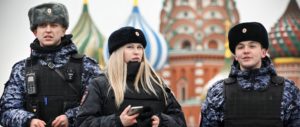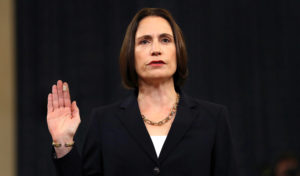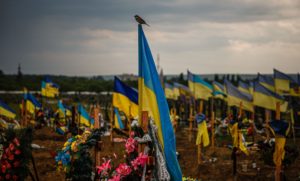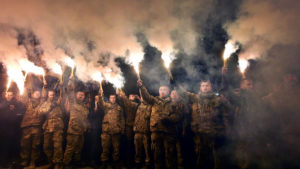The biggest threat facing Putin today is not from Western-sympathising, anti-war liberals, but Right-wing “ultra-patriots” frustrated by the Russian army’s failures in Ukraine. Earlier this month, the Russian MP Oleg Matveychev warned of a potential coup: “The situation is not so critical yet, but 2023 will be very dangerous.” Turbo-patriots are now “the only danger to our state,” he said.
These dire premonitions are exaggerated but, with Alexei Navalny in prison, and many liberals in exile, disillusioned patriots are the only opposition force left in town. They include ordinary Russians, who are furious with the elites for profiting from the fighting, while buying and schmoozing their way out of military service. But that doesn’t translate into a desire to end the fighting: the ultra-patriots want Russia to be victorious over Ukraine and the West, even if it means waging war harder, faster, and more effectively.
These “turbo-patriots” don’t form a coherent political group. Rather, they are an unholy combination of ethno-nationalists, opportunistic military bloggers, imperial romantics, volunteer groups and neo-Nazis. What they all share is a militaristic nationalism, distrust of the West and of liberalism more broadly, patriarchal values, and a strong desire to see Russia win over its enemies.
One of the best-known turbo-patriots is Igor Girkin, 52, who never misses an opportunity to denounce Putin’s handling of the war. A former FSB officer, Girkin is backed by the imperialist Orthodox billionaire and coup-plotter extraordinaire, Konstantin Malofeev. He played a pivotal role in sparking the 2014 conflict in Donbas, but was recalled to Moscow after the downing of flight MH17 and the deaths of its 298 passengers, for which a Dutch court found him guilty in absentia in 2022.
Girkin mockingly refers to Putin as “Our Sacred Geogalactic-brained Strategist” and has accused Russia’s defence minister Sergei Shoigu of “criminal negligence”. While it’s clear Putin is also unhappy with his generals, ultra-patriots like Girkin believe his constant interference with military strategy is only making the situation worse. The Russian President is micromanaging from afar, causing delays in the already-stilted army communications networks. By shuffling commanders around, he is heightening confusion while further depressing the troops.
The Kremlin has gone to great lengths to undermine Girkin’s appeal: preventing him from travelling to the frontline to fight, and setting Putin’s attack dog Yevgeny Prigozhin, the 61-year-old head of the Wagner Group, against him. Prigozhin, like Girkin, also belongs to the disparate band of ultra-patriots; this week, he accused Shoigu and his most senior general of treason for withholding ammunition and supplies from Wagner fighters. The difference is that Prigozhin is unflinchingly loyal to Putin.
The most extreme ultra-patriots come from Right-wing Neo-Nazi groups, who despise the ethnic minorities that are over-represented in the regular Russian army. Their popularity is limited in Russia, where ethnic nationalism has traditionally been viewed with suspicion. With 190 different ethnic groups, Russia is too diverse for any ruler to use ethnicity as a rallying cry, for which reason managing ethno-nationalism has long been a political priority for Putin. But that doesn’t mean there isn’t a latent audience for many of their ultra-Right-wing ideals.
The Neo-Nazis may lack supporters, but the xenophobic ideas they propagate echo the prejudices of many Russians who are hostile to dark-skinned people from the north Caucasus and former Soviet Union. The statement “Russia — for ethnic Russians” has reached its highest level of approval since polling began more than 30 years ago, with some 55% of Russians now agreeing with it. This speaks more to a stubborn everyday racism than to ideological commitment, but it lays the groundwork for a more sophisticated patriotic narrative to take hold.
Few ultra-patriots are Neo-Nazis; most are far less radical. Patriotic volunteer groups have sprung up in response to the army’s woeful lack of equipment and food, reflecting a new lease of life for the otherwise moribund Russian civil society. This grassroots movement contrasts sharply with the corruption of Russia’s elites, which has become a matter of life and death, with soldiers’ equipment being stolen or going missing. One recent scandal, covered generously in the nationalist-leaning media, concerned a company belonging to the son of a prominent official, which was selling the army uniforms at inflated profits and pocketing the difference.
Roman Yuneman, 27, is the founder of an influential volunteer movement called Society.Future. Born in Germany, he has criticised Putin’s invasion of Ukraine, but still wants the Russian Army to win, adopting a “my country right or wrong” stance that resonates widely with Russian society. To spread his message, he has led humanitarian missions to Mariupol and Severodonetsk. He is using Society.Future to raise funds for war-stricken civilians, but also as a political launchpad, touring the country to share his views on the problems blighting Russia’s future.
One prominent member of Society.Future is Nikolai Kolosov, a former Donbas fighter turned political activist. In a widely watched debate, he won an argument against Vladislav Ugol’ny, a blogger who has called for the biological destruction of the Ukrainian nation. Kolosov, by contrast, dismissed the conquest of Ukraine as an impossible dream that the Russian people don’t want, and the Russian army isn’t capable of. His victory shows that the most popular ultra-patriots aren’t the most radical, but the most realistic: though Kolosov supports his country, he believes that the Kremlin should stop the war, reinforce the occupation of Donbas, and spend the money and resources on solving the many problems facing ethnic Russians at home.
Another prominent pro-war civil activist, Anastasiya Kashevarova, is similarly critical of the Kremlin’s decisions. Kashevarova helps women and mothers to find their missing husbands and sons, arranging prisoner exchanges and hunting down information about loved ones. Her activism is not political so much as a patriotic act, and therein lies its appeal.
There is, however, a dark side to this community patriotism: not everyone is welcome. On Telegram, Society.Future’s leaders are disparaging of Russia’s Muslim-majority North Caucasus regions, especially Chechnya and the Putin-loyalist head of Chechnya, Ramzan Kadyrov. They openly balk at Muslim battalions like Akhmat attacking Slavic Ukrainians and complain that Chechens enjoy privileged treatment in Russia.
For now, the Kremlin tolerates these wrong-thinking volunteer groups because they help to fill woeful gaps in the army’s resources. But perhaps it is foolish to. While Matveichev’s claims of a coup are wildly exaggerated, there’s no doubt this new wave of patriotic groups poses a significant threat to the multinational fabric of Russian society and to the Kremlin’s monopoly on patriotism.
The West tends to overstate the importance of Russia’s liberal opposition. The probability is that, when the Putin regime eventually falls, ordinary Russians will not turn to exiled liberals in Vilnius. Rather, they will look to those ultra-patriots that stayed around, supported them, and — in their eyes — saved Russians from further suffering.
Disclaimer
Some of the posts we share are controversial and we do not necessarily agree with them in the whole extend. Sometimes we agree with the content or part of it but we do not agree with the narration or language. Nevertheless we find them somehow interesting, valuable and/or informative or we share them, because we strongly believe in freedom of speech, free press and journalism. We strongly encourage you to have a critical approach to all the content, do your own research and analysis to build your own opinion.
We would be glad to have your feedback.
Source: UnHerd Read the original article here: https://unherd.com/






